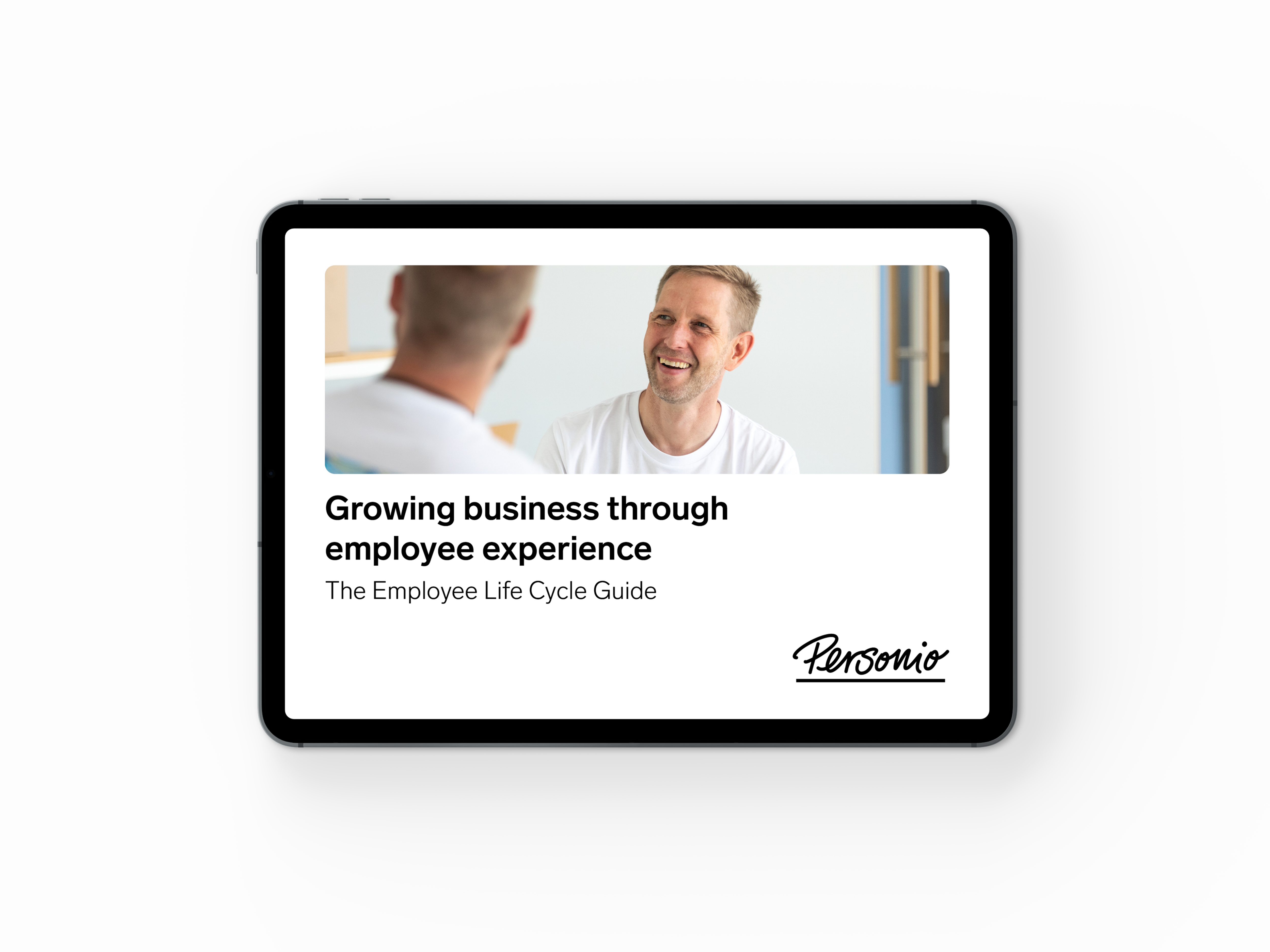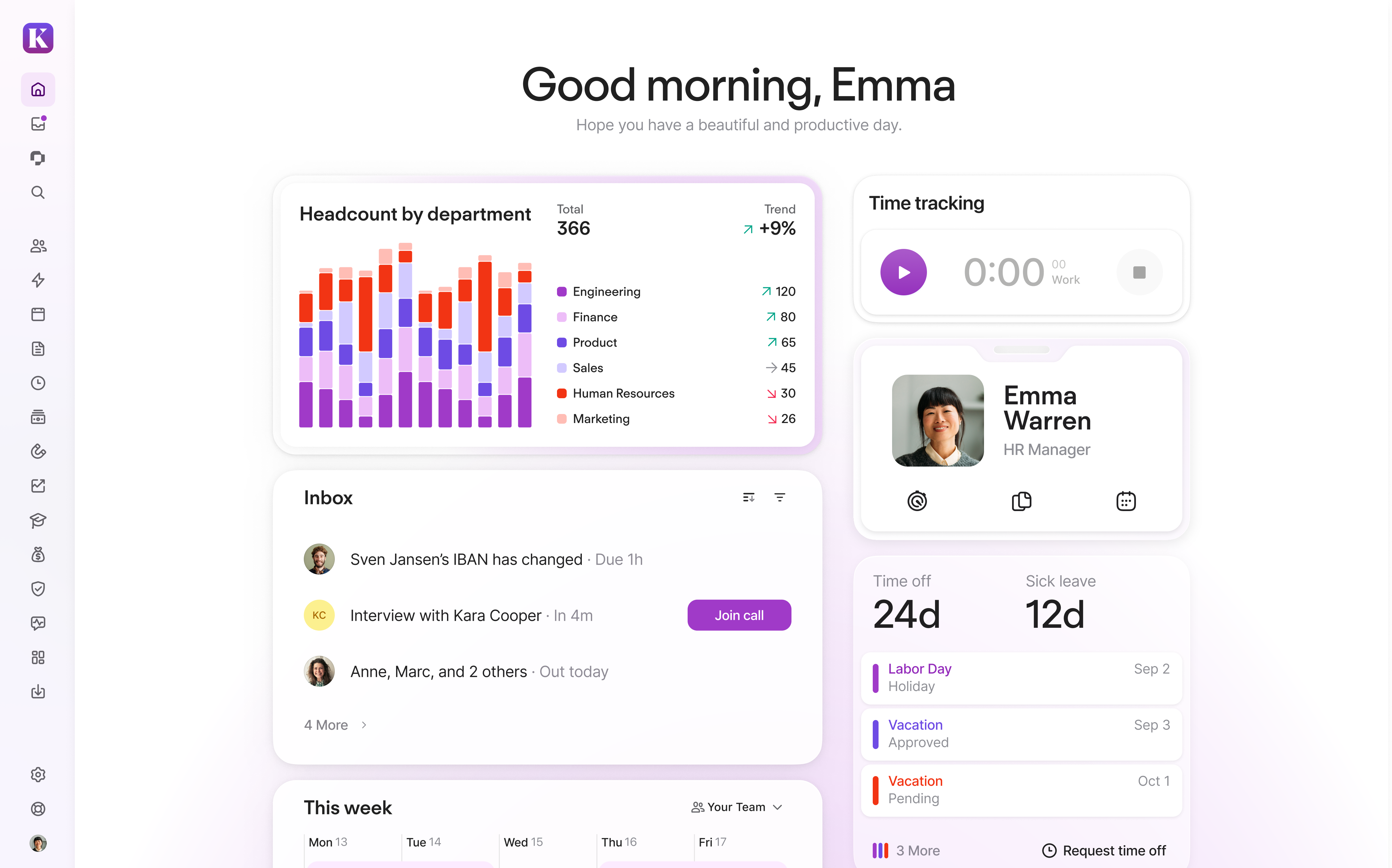Latest Blog Posts
What is HRIS?

The term HRIS means Human Resources Information System. An HRIS is a system or software used to collect, manage and run HR processes and programmes based on employee data.
From recruiting and onboarding to managing, developing and paying employees, a HRIS software solution simplifies every stage of the employee lifecycle.
In this article, we'll guide you through the definition of HRIS, how it works and how top-rated systems can benefit your organisation.
Look at how Personio optimises every stage of the employee journey in our guide to what an HRIS is.
What is an HRIS?
A human resources information system (HRIS) is software that centralises and automates everyday HR tasks, from daily processes, large-scale activities, to general workforce management.
Key benefits of HRIS software include time savings, secure data storage, automated workflows, and improved employee and candidate experiences.
The right HRIS software should offer a user-friendly interface, a wide range of features and a dedicated customer support and implementation team at the ready.
Key features and benefits of an HRIS
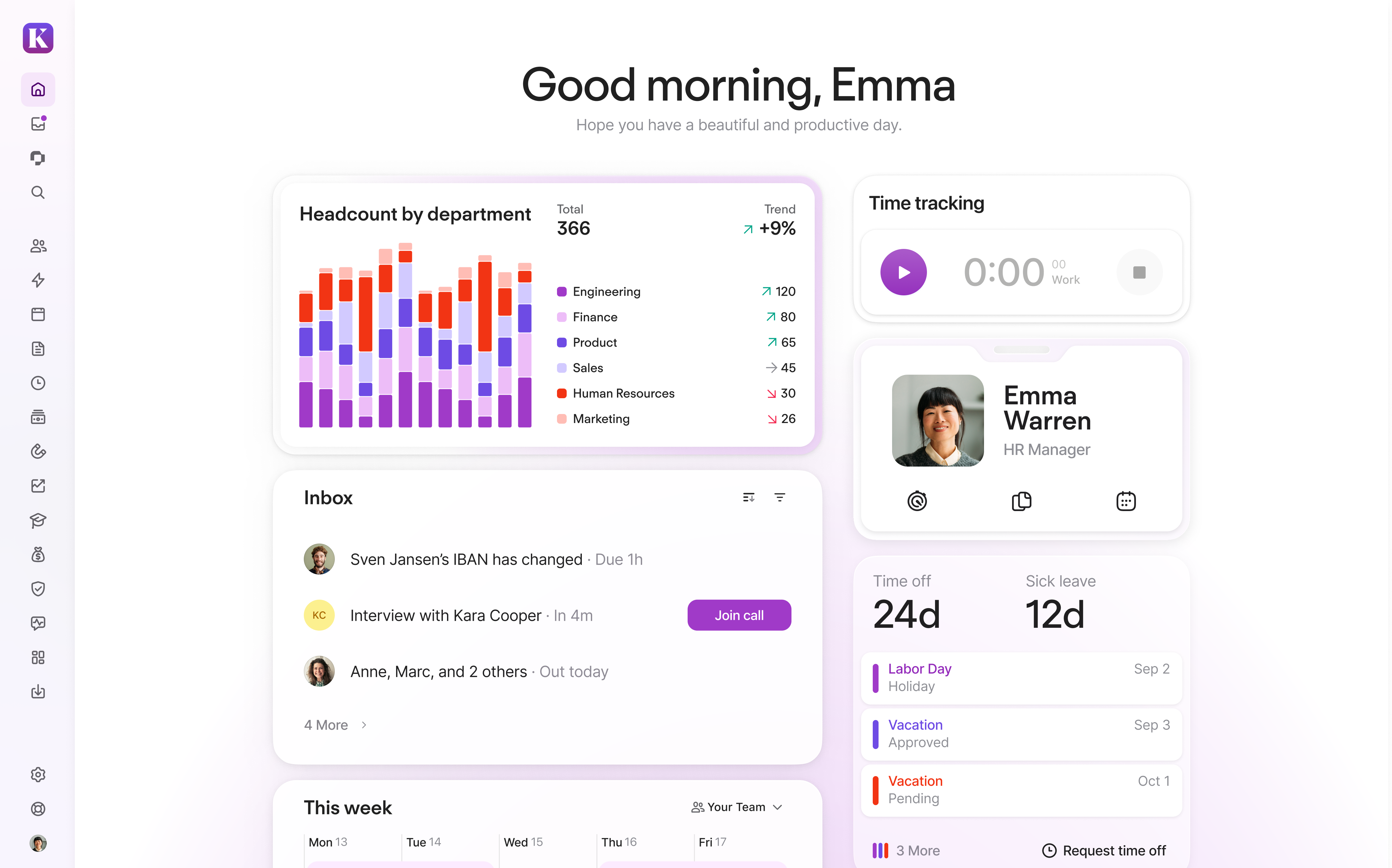
Most top-rated HRIS systems offer core functionality to manage HR processes at scale. Here are the key features and benefits:
Function | Description |
Data management | HRIS provides a central repository for storing and managing employee information, making it easy to access and update records. |
Recruitment and onboarding | Streamlines the hiring process by managing job postings, applications, candidate tracking, and onboarding activities. |
Compliance and reporting | Generates reports for compliance with labour laws and regulations, reducing the risk of legal issues. |
Employee self-service | Allows employees to access and update their personal information, view pay slips, and request leave, enhancing their engagement and satisfaction. |
Analytics and decision-making | Provides insights through data analytics, helping HR professionals make informed decisions about workforce planning, talent management, and other strategic areas. |
Performance management | Facilitates performance reviews, goal setting, and tracking employee progress, helping to align individual performance with organisational objectives. |
Benefits of using an HRIS for teams
Every business has unique HR challenges, but most can benefit from implementing a modern HRIS system Here are the top advantages of Personio’s HRIS:
Time savings
Personio can save HR teams up to 60 hours per month by automating data entry, reporting and signature collection, meaning more time focused on strategic work.
Clean databases
An HRIS can help keep teams organised by providing a single source of truth for employee data. This improves transparency, reduces errors, and ensures teams have access to consistent, up-to-date information.
Complete compliance
A 100% compliant HRIS aligns with European data standards (GDPR) and other data standards, ensuring employee information is stored diligently and processed securely. After all, people in your organisation need to trust that their data is in safe hands.
Great candidate experiences
A strong HRIS supports recruitment workflows, helping to deliver a seamless and professional experience for candidates and new hires alike. Your processes, productivity and culture all benefit, which is reason enough to implement an HRIS.
Data-based decisions
Built-in HR analytics allow you to generate reports instantly, giving your team insights to support workforce planning and strategy.
Modern HR teams deserve a modern HRIS

Trust Personio's all-in-one HRIS to help take your work to the next level. From one place, you can recruit, onboard, manage, develop and pay all your employees. Find out why 14,000+ companies trust Personio with their people work.
How to choose the right HRIS
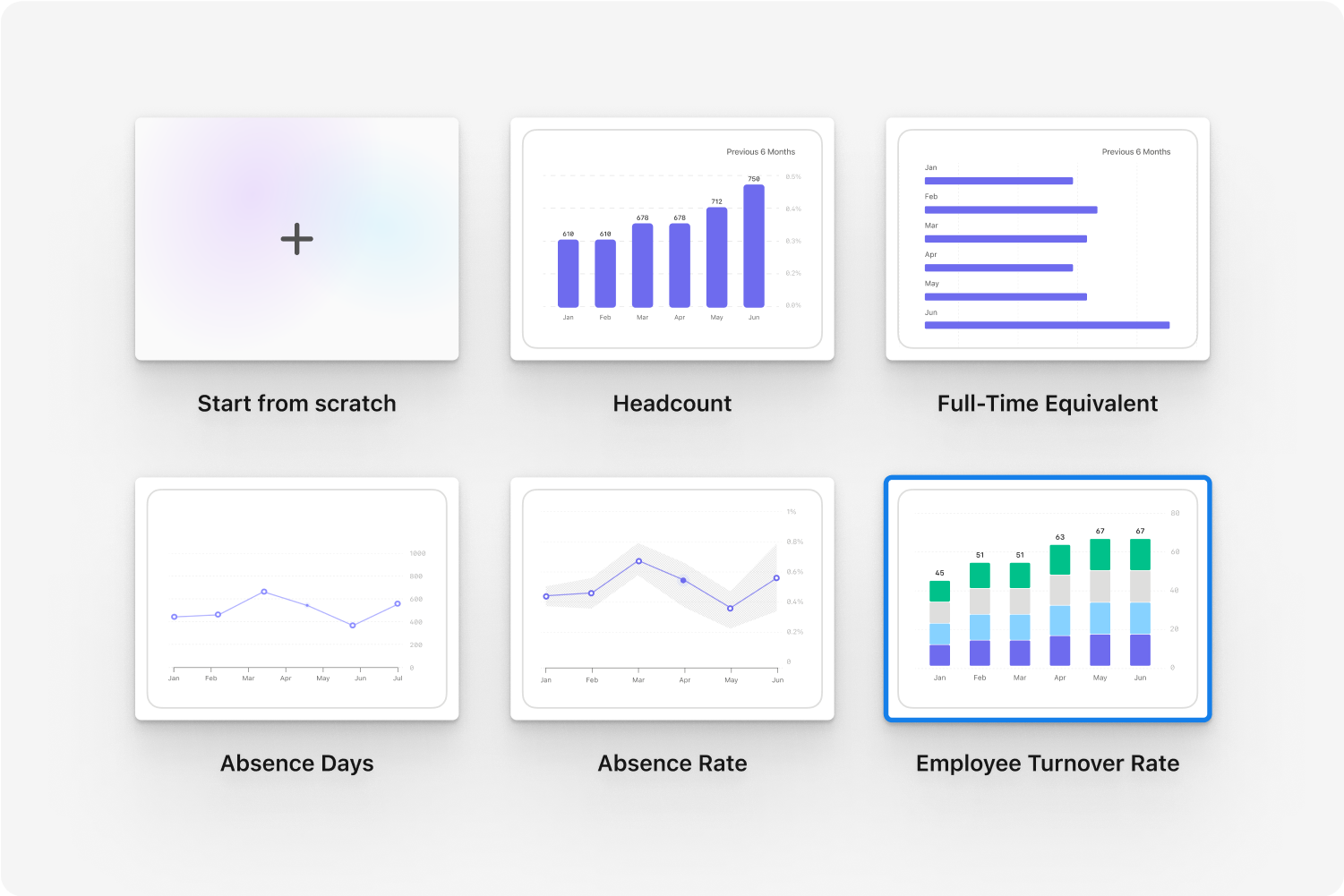
Choosing the right HRIS software involves assessing your team’s size, goals, and growth plans. Consider these key factors:
Data privacy | The storage of personal employee data is massive for organisations. How is your HRIS going to keep your data secure? |
Training and adoption | People need to know how to use your HRIS and want to use it. Are you accounting for user-friendliness? |
Cost | Purchasing an HRIS is an investment. How much it costs is naturally going to come up. |
All these considerations only make it more important that your team invests in the right solution. Below, we've provided five of the top questions you should ask when it comes to choosing and implementing the best HRIS for your organisation:
1. How big is your organisation and team?
Your HRIS should support your current workforce and scale as your team grows. Look for a solution that evolves with your business needs.
A small HR team needs efficiency now, but also flexibility for the future. Having time to focus on topics like salary benchmarking, diversity and inclusion, or core processes like onboarding or performance, requires a solution that doesn’t need babysitting every time you add new employees.
So, how big is your team? At Personio, we focus on the needs of European companies with 10 to 2,000 employees are trying to streamline and standardise their HR processes for peak performance. Our customisable solution is designed to meet the needs of growing teams and help them scale efficiently.
2. Are you trying to scale your teams and business?
Whether large or small, every organisation needs top talent. Therefore, your HRIS must streamline the entire hiring process, from sourcing great talent to ensuring a top candidate experience and recruiting journey.
If you are trying to grow your team or meet your lofty hiring goals (whether quantitatively or qualitatively), you need an HRIS that can manage candidates, automate your responses (like confirmation emails for resumes) and store feedback from interview rounds and potential supervisors.
The greatest competitive advantage: Top HRIS systems can turn a candidate into an employee with one click. Within Personio, we try to make it easy by automating hiring, electronic contract signing, and candidate communication.
3. How important is development in your organisation?
What kind of weight does your organisation put on performance and development? A great HRIS not only focuses on storing data but on taking things to the next level when it comes to getting the absolute most out of your top talent.
In addition, it means your organisation doesn’t have to worry about purchasing, implementing and managing a solution for data and a solution for performance. Instead, you can have everything at once.
Performance software looks like this: Automating your performance cycles, automatically reminding managers about performance talks and keeping feedback and goals in one place.
4. Which HR processes do you want to master?
As an HR function, there’s likely a whole host of processes that you want to focus on. So, you need a solution that can help you get started, optimise and master whatever you want to accomplish for your people.
That could be recruiting, onboarding, performance, payroll or anything in between. An all-in-one solution can ensure that you are able to tackle everything that you want, while giving you the time back to approach each of these issues strategically.
5. What does your budget look like?
How much does it cost to invest in an HRIS? Speaking from our own experience at Personio, our HRIS is positioned around twotypes of plans: Core and Core Pro. The idea is to provide something that works for just about any organisation and is billed on the number of employees that need to be managed, per month.
But, to answer this question, we’d suggest visiting our guide to HR software pricing to learn a bit more about the investment and your return on using Personio.
A single system for your impact-driven organisations
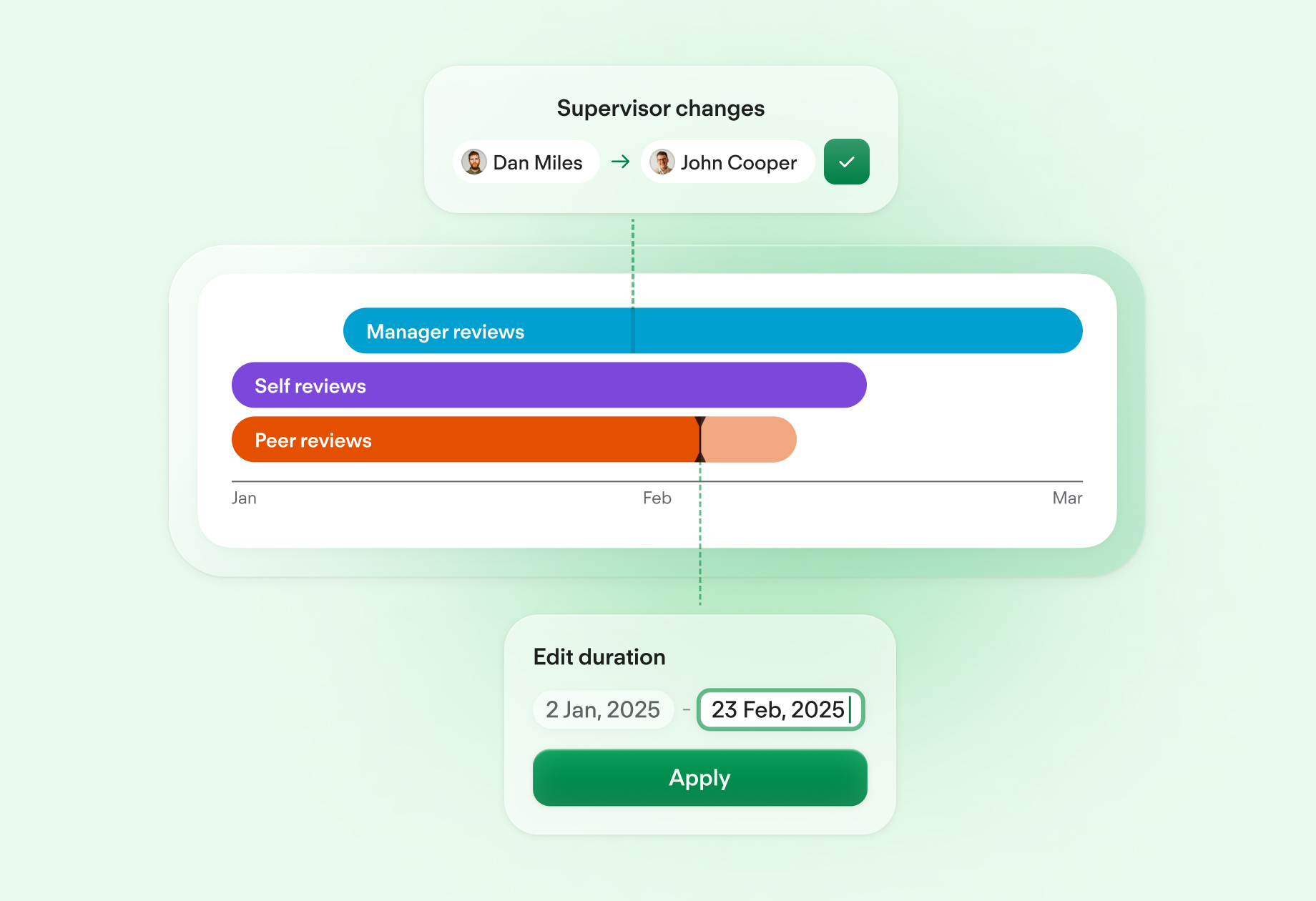
A great HRIS is not only built for your team today. It's built to help tackle your unique challenges now and into the future.
Personio is an HR software that serves each stage of the employee lifecycle. That means helping recruit, manage and develop your employees. And everything in between!
Speak to one of our product experts about our HRIS solution and implementing Personio in your organisation — for the benefit of your HR team — today.
HRIS: Frequently asked questions
What are the must-have features for an HRIS system?
A robust HRIS system should include essential features such as employee database management for centralised record-keeping, recruitment and onboarding tools to streamline hiring processes, and automated payroll management to ensure accuracy and compliance.
Additionally, performance management features for conducting reviews and setting goals, time and attendance tracking, compliance reporting to meet legal requirements, employee self-service portals for personal information updates, and analytics and reporting tools for data-driven decision-making are crucial.
When is the right time to invest in HRIS?
The right time to invest in an HRIS is when your organisation experiences growth that makes manual HR processes inefficient and error prone.
Indicators include increased employee headcount, the need for more streamlined recruitment and onboarding processes, challenges in managing payroll and benefits accurately and the necessity for compliance with complex labour laws.
If your HR team is spending too much time on administrative tasks rather than strategic initiatives, it’s a clear sign that an HRIS could add significant value.
Are there different types of HRIS systems?
Yes, there are different types of HRIS systems tailored to specific organisational needs.
These include:
Basic HRIS for small businesses focusing on core HR functions.
Comprehensive HRMS (Human Resource Management Systems) that integrates payroll, benefits, and performance management.
Strategic HRIS, which includes advanced analytics and workforce planning tools.
Additionally, specialised HRIS platforms may focus on specific aspects such as talent management or learning and development. The choice of system depends on the size, complexity, and specific HR goals of the organisation.
